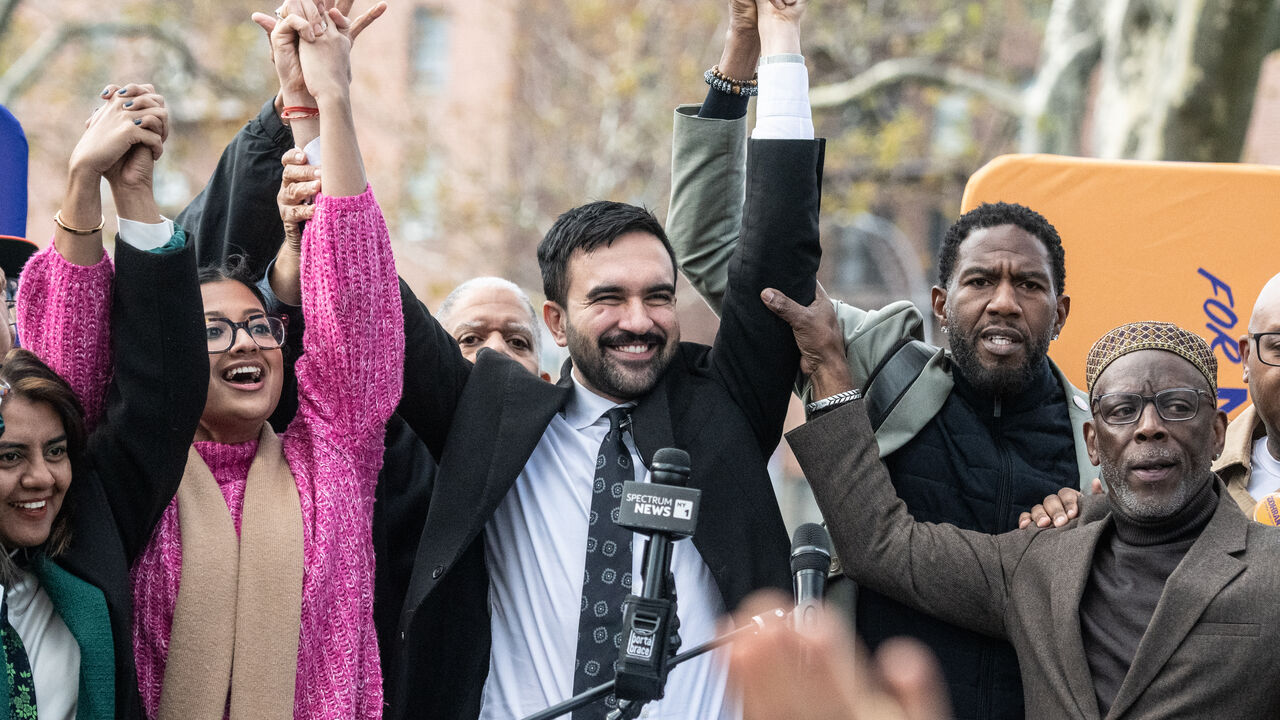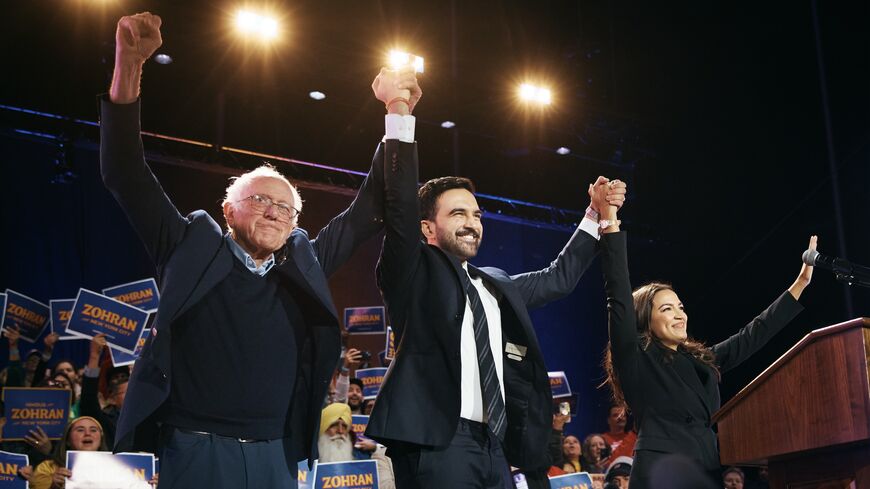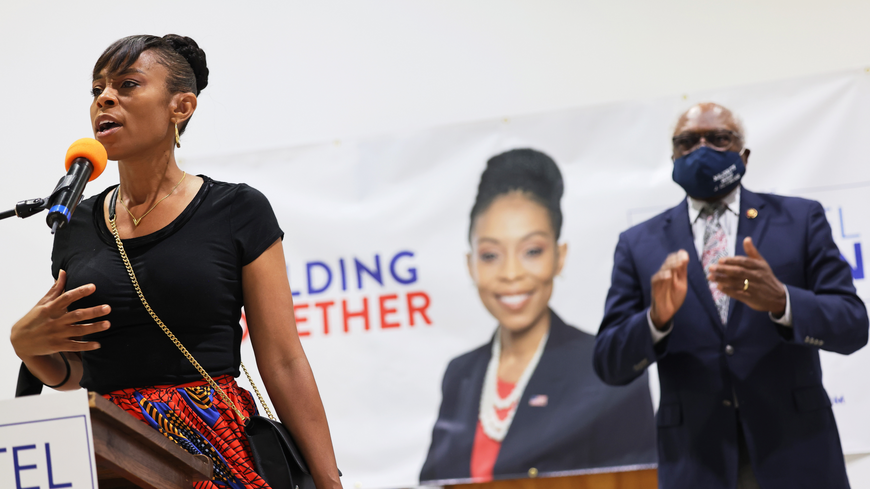For Arab and Muslim Americans, Mamdani's victory grants seat at table
Zohran Mamdani will be New York City’s first Muslim mayor, a milestone celebrated by Muslim and Arab organizations nationwide.

WASHINGTON — Zohran Mamdani’s election as New York City’s first Muslim mayor this week drew widespread praise from Arab American and Muslim organizations that hailed the victory as a historic moment for political representation and increased visibility in US politics, especially given the mayor-elect’s vocal support on the Palestinian issue.
What happened: On Tuesday night, Mamdani won the mayoral race, securing a decisive victory with over 50% of the vote against Andrew Cuomo. Mamdani won the vast majority of the Muslim votes — about nine in 10 Muslim voters supported him, according to the AP Voter Poll. The city has the largest Muslim population in the United States, with over 750,000 Muslim residents.
A democratic socialist, Mamdani ran on a platform that included a citywide rent freeze and expanded affordable housing, free city buses, universal child care, a $30 minimum wage by 2030 and expanded public services funded through a 2% tax increase on individuals earning over $1 million annually and a 4.5% corporate tax hike.
Mamdani, 34, also made a concerted effort to engage Arab American and Muslim communities. His campaign released a video in Arabic directly addressing Arab-speaking voters, and campaign teams visited over 130 mosques throughout the city while conducting outreach calls in Arabic, Urdu, Bangla and other languages.
أنا اسمي زهران ممدان وعم رشّح حالي لأكون العمدة الجديد في مدينة نيويورك pic.twitter.com/ptfVdpansX
— Zohran Kwame Mamdani (@ZohranKMamdani) November 1, 2025
Background: For many critics, his democratic socialist policies were at the heart of their opposition. But for others, his identity as a Muslim loomed just as large, leading to a wave of Islamophobic attacks on the candidate. Prominent Texas Republican Senator Ted Cruz referred to Mamdani in a post to X on Monday as a “communist jihadist.”
Some, including Representative Elise Stefanik (R-N.Y.), have said Mamdani is antisemitic due to his views on Israel, which he has said has a right to exist as a state with equal rights for all but has declined to affirm its right to exist as a Jewish state.
Asked about the anxiety some Jewish residents of the city are experiencing at a press conference on Wednesday morning, Mamdani said, “I look forward to being the mayor for every person that calls this city home. That includes the Jewish New Yorkers that voted for our campaign and those that didn’t.”
Why it matters: Throughout his political rise, Mamdani was not shy about his critical views on Israel, referring to it as an apartheid state and declining to affirm its right to exist as a Jewish state, saying Israel should provide equal rights for all residents. On the two-year anniversary of Hamas’ Oct. 7 attack, Mamdani released a statement that called Hamas’ attack a “horrific war crime” and went on to add that, in the aftermath of that day, “Prime Minister Netanyahu and the Israeli government launched a genocidal war,” in which the US government has been “complicit.”
Those positions would have sunk US political candidates in the past, but there has been a shift in US public opinion on Israel following the Gaza war and among Democrats. According to a recent Pew Research Center survey released in April, 53% of US adults now express an unfavorable opinion of the Israeli government, up from 42% in March 2022. These numbers are even more striking among Democrats, among whom 69% expressed an unfavorable view of Israel, up from 53% in 2022.
The issue of Gaza ranks particularly high for Muslim Americans. In 2024, a study by the Institute for Social Policy and Understanding showed that 35% of Muslim Americans cited Gaza as the most salient issue when it came to voting for a presidential candidate.
Khaled Elgindy, a senior fellow at the Quincy Institute for Responsible Statecraft and adjunct instructor at Georgetown University’s Center for Contemporary Arab Studies, said that Mamdani’s victory marks a turning point in American politics: “The fact that Israel is not a losing issue, that being on the ‘wrong side’ of the Israel issue does not tank your candidacy but in fact can actually help, is not something that we've ever seen in American politics.”
Criticism of Israel has historically carried electoral risks in American politics. In recent years, several progressive lawmakers have faced intense pushback for their views on the war in Gaza and US policy toward Israel. Former Democratic representatives Jamaal Bowman of New York and Cori Bush of Missouri were defeated in their 2024 primaries after unprecedented spending by pro-Israel political action committees.
The American Israel Public Affairs Committee channeled its campaign spending through an affiliated super PAC, the United Democracy Project. Super PACs are legally allowed to raise and spend unlimited sums of money but cannot coordinate directly with candidates. UDP poured more than $14 million into Bowman’s race, helping Westchester County Executive George Latimer unseat him in what became the most expensive House primary in US history. Bowman, who was among the first members of Congress to call for a ceasefire after the October 2023 Hamas attacks, had also voted against a House resolution declaring that Israel “is not a racist or apartheid state” and publicly referred to Israel’s campaign in Gaza as “genocide.”
Bush faced similar headwinds in Missouri’s 1st District, where outside groups spent roughly $15 million to boost her challenger, St. Louis County Prosecutor Wesley Bell, including more than $8 million in pro-Israel aligned PAC spending. Bush, who had accused Israel of carrying out an “ethnic cleansing campaign” in Gaza and linked Palestinian struggles to the US civil rights movement, was ultimately unseated in what became the second most expensive House primary in history.
The Council on American-Islamic Relations and its New York chapter celebrated Mamdani’s victory in a statement late Tuesday, calling it a “major turning point” for Muslim political engagement and a “historic rebuke” of both anti-Muslim hate and anti-Palestinian politics. The organization praised the election of a mayor who “openly advocated for Palestinian rights.”
Zohran Mamdani is speaking at the Islamic Cultural Center of the Bronx this afternoon, after Andrew Cuomo agreed to comments made on Sid Rosenburg’s podcast yesterday that Mamdani “would probably cheer” another 9/11 pic.twitter.com/SHxdCKNMhe
— Tsehai Alfred (@TsehaiAlfred) October 24, 2025
Advocates also see Mamdani’s victory as part of a broader shift in American politics, where embracing Muslim identity and other Arab identities — his wife, Rama Duwaji, is Syrian-American — is no longer treated as politically disqualifying.
Elgindy said that Mamdani “doesn't run away from those identities in the way that I think any other Muslim politician that we've seen is told, 'Try to Americanize your name. Try to downplay your Muslimness.'”
This ability to embrace his Muslim and Arab identity could be a key reason for Mamdani’s widespread popularity not only in New York but across the country. “Frankly, anywhere,” Elgindy said. “People in Michigan, in Illinois, in California are saying the same thing: 'He represents me. We all win with his victory.'”
The Muslim Community Network of New York City, a civic engagement group, wrote in an Instagram post on Tuesday night that the win represents a “monumental moment for Muslims not only here in NY but around the world.”
Celebrations in Astoria, Queens, after Zohran Mamdani won the mayoral election, becoming New York City’s first Muslim and South Asian mayor. #newyork #astoria #zohranfornyc pic.twitter.com/gtO9bhMlhn
— Rabia İclal Turan (@iclalturan) November 5, 2025
Know more: Many Arab Americans and Muslim voters see his victory as a breakthrough, a moment that validates their presence in American politics. Elgindy compared the moment to when Barack Obama won the US presidential election in 2008 to become the first Black president. The feeling among many in the Muslim community, Elgindy says, is that “We finally have a seat at the table in big league American politics. ... Our participation in American politics has been normalized, not in a way that is comfortable or easy. It's been very difficult.”




